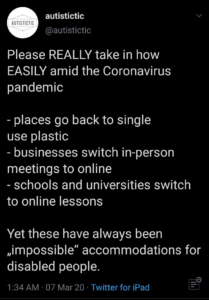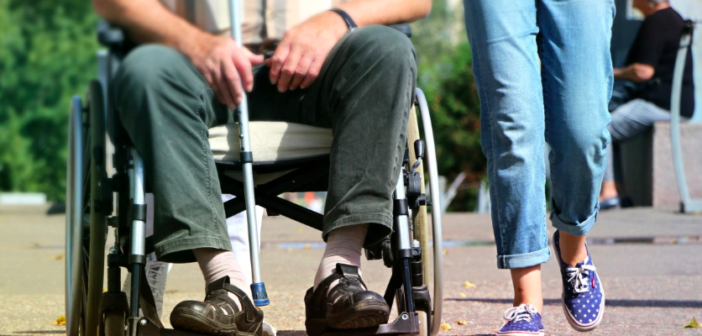In the midst of collective global chaos as every country scrambles to find alternative ways to keep society functioning, a thought comes to mind. Why had our world been operating the way it did before this virus enveloped our lives?
These past few weeks as I’ve paced restlessly about my home, tried to keep up with online assignments and binge-watched apathetically, a tweet popped up on my social media feed that pricked me like a long-buried thorn and reopened a festering wound in my psyche.

I began to pick at the wound, finding post after post from disabled people expressing similar frustration that seemingly simple accommodations were being implemented en masse despite the need for them always being present for their community. What does it say about the structure of our world that only a pandemic can result in meeting the needs of a vulnerable population, and their needs are being met only as an afterthought to protecting the majority? Are disabled lives less valuable? No, of course not, you say.
But reality tells a different story, disabled needs have always been secondary. When the world is “normal” accommodations are deemed unreasonable, yet now that society is the one that is sick and disabled it receives support we don’t afford to individuals. Why? If it were possible all along, what excuses are we making for letting down our fellow humans so terribly simply because they do not make up the majority?
And even as it seems we might reach some positive turning point from all this, concrete change remains uncertain. Societal accommodations are here on a wider scale than ever before, but many disabled people are still being left behind. Immunocompromised people face monumental risk of contagion, new complex barriers arise from isolation and talk of potential rationing of medical care and equipment has put the disabled community on edge.
The irony of our present worldwide fear is that disabled people are simultaneously most at the mercy of the pandemic yet also the ones most equipped to handle it. Disability activists have taken to social media to point out that all the solutions being implemented are ones that have been championed or utilized by disabled people for decades.
Many are intimately familiar with wearing masks, disinfecting surroundings and being isolated from others (whether by necessity or through societal neglect). Fighting off boredom and surviving in restricted environments are nothing new.
Disabled people have a lot of insight to offer the abled majority stepping into their world. And some are willing to share that insight, even knowing they are providing what would seldom be offered to them by the majority population under any other circumstances.
I’m one of the lucky ones. Before all this, I was receiving adequate support to mitigate the obstacles society normally presents to someone disabled in the ways I am. Even as I currently struggle during our collective isolation, the countless disabled people who were barely treading water and are now actively drowning weigh heavily on my mind.
Something rarer to disability than to many other social categories of people is that anyone can become disabled at any time. Sometimes a disability or illness is temporary, but even so, one will require a certain level of accommodations. Perhaps just as we are now all trying to protect society by assuming that every one of us may have the virus and then taking measures to prevent possible spread, we can continue a similar sort of thinking in the future when the world finds some equilibrium again.
So once our world reopens and you are back to making the typical decisions of your day-to-day life, I want you to look for the glass.
Next time you go to the doctor, the airport, the grocery store. Next time you take public transportation, go out to a restaurant or go on vacation. Next time you go to school or work. Next time you vote in federal or local elections. Try and spot the invisible barriers that you are able to pass through unabated and make decisions that will tear them down for you and everyone you care about.
And for the strangers, too. The people you pass by every day who are struggling to be heard behind the glass.
Next time, shatter the glass.


2 Comments
Beautifully written.
A thoughtful, eye-opening read, Megan. Thank you!